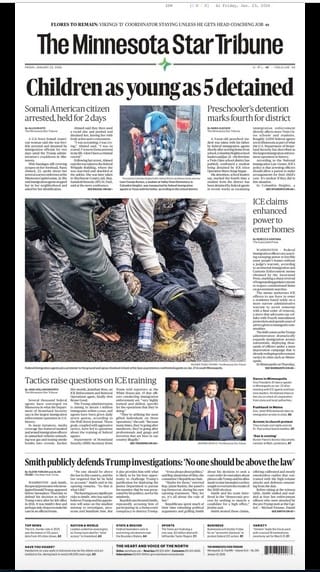Post #4: What We Are Told, What We Are Telling Ourselves

"That evening I discussed the prospects of the new government with my father. We agreed that it had a good chance of doing a lot of damage, but not much chance of surviving very long: a deeply reactionary government, with Hitler as its mouthpiece . . . . Besides, who were the people who had suddenly starting voting Nazi in the last three years? Misguided ignoramuses for the most part, victims of propaganda, a fluctuating mass that would fall apart at the first disappointment," (107-8) Sebastian Haffner, Defying Hitler
Many of us are struggling to make sense of the current moment—how much damage have we taken? How rapidly might the ship take on water? What is the state of the life boats? Media and social media commentary runs the gamut, from failure to register a problem at all, to clear declarations of a coup, and everything in between. I'd like to consider how two of our Learn, Imagine, Act readings may illuminate our mental responses and possibly help arm us for withstanding and resisting this experience.
Within days of the 2016 presidential election, Masha Gessen's "Autocracy: Rules for Survival" appeared in the New York Review of Books. Gessen is a nonbinary Jewish journalist with Russian and U.S. citizenship. You can find a pdf here: https://madisonnjdems.com/wp-content/uploads/2016/11/autocracy_-rules-for-survival-_-by-masha-gessen-_-nyr-daily-_-the-new-york-review-of-books-1.pdf
Gessen's 2016 rules are worth reading now. Especially relevant to the Sebastian Haffner excerpts I'll be considering in this post, are Rule #2: "Do not be taken in by small signs of normality," and Rule #4, "Be outraged." Gessen asserts that "in the face of the impulse to normalize, it is essential to maintain one’s capacity for shock. This will lead people to call you unreasonable and hysterical, and to accuse you of overreacting. It is no fun to be the only hysterical person in the room. Prepare yourself." Perhaps it's just confirmation bias, but I appreciate Gessen's support here for doing what I am already doing.
Expanding on this essay, their book Surviving Autocracy was published in June of 2020. In a Commonwealth Club interview, Andrea Bernstein asks Gessen, "How is it possible for someone to get their bearings when so much crumbles so quickly?"
This question goes to the heart of the book, which Gessen half-jokingly agrees is "a kind of self-help book." It was written to help people "hold on to enough clarity of thought" in the face of autocracy, and specifically, a "kakistocracy," meaning "the rule of the worst."
Clarity of thought can be hard to maintain, due to Trump's use of the "power lie" and the fact that "he also just uses words to mean nothing." Gessen explains that the power lie is "the bully lie," that blatantly defies reality: "There is no defense against this lie because the point of the lie is to assert power, to show 'I can say what I want when I want to'"(106).
"If politicians, journalists, and even kitchen-table debaters adopted the habit of better defining their terms, we would understand each other better—and begin the process of restoring language" (Gessen, 98).
What I found most helpful in Surviving Autocracy is Gessen's emphasis on the importance of "restoring language," and their descriptions of the psychological difficulties of life under a power liar. Two passages particularly struck me.
In the first, Gessen points out that "when writers and academics question the limits of language, it is invariably an exercise that grows from a desire to bring more light into the public space, to arrive at a shared reality than it was before the conversation began: to focus ever more tightly on the shape, weight, and function of anything that can be named, or to find names for things that have not, in the past, been observed or been seen as deserving of description" (96). This is a quite different motivation than the "alternative facts" treatment that was so clearly on display by spokespersons such as Kellyanne Conway. (And the "finding names for things" part merits another essay of its own.)
Any notion of a shared reality is precisely what an autocrat is attempting to disassemble for his own advantage: "Unmoored from reality, the autocrat has no need to be consistent. In fact, the ability to change his story at will is a demonstration of power" (108).
The second passage describes the psychic impact:
"Being an engaged citizen of Trump's America means living in a state of cognitive tension. One cannot put the president and his lies out of ones' mind, because he is the president. Accepting that the president continuously tweets or says things that are not true, are intended to be heard or read as power lies, and will continue to be broadcast . . . after they have been repeatedly disproven means accepting a constant challenge to fact-based reality. In effect, it means that the two realities—Trumpian and fact-based—come to exist side by side on equal ground. The tension is draining. The need to pay constant attention to the lies is exhausting, and it is compounded by the feeling of helplessness . . ." (110).
Right now, the "so much" that "crumbles so quickly" and threatens our bearings is not solely changes in policy or process (though these are extreme, and extremely destructive), or the shockingly rapid, forced conversion of our institutions to an antagonistic worldview, but also this very attack on language and shared reality. Because this is an attack on our consciousness. For me, simply seeing Gessen name this so clearly is a relief and defuses some of the power of the attack. It places something like the insistent renaming of the Gulf of Mexico into context. Naming it helps us hold on to our clarity of thought.
In Defying Hitler, an unfinished memoir written in 1939, Sebastian Haffner movingly describes his experience as a young man living in cognitive tension in Berlin. In the stunning passage that follows, he recalls events in the spring of 1933, when the Nazis have announced that a "Jewish boycott" would commence on April 1. He observes,
"Incidentally, it is typical of the early years of the Nazi regime that the whole facade of everyday life remained virtually unchanged. The cinemas, theaters, and cafes were full. Couples danced in the open air and in the dance halls. People strolled down the streets. The Nazis used this to great effect in their propaganda. 'Come and see our normal, peaceful, quiet country. Come and see how well even the Jews are doing here.' The secret vein of madness, fear, and tension, of living by the day, and dancing a dance of death: those one could not see. Just as when you see the smiling face on a poster for razor blades in today's subway stations, you do not see that it belongs to a man whose head was cut off in Plötzensee prison four years ago, for 'high treason,' or what goes by that name today" (154).
In our time, the difficulty of navigating "two realities"—Trumpian and fact-based—seems observable in disclaimers some people resort to, when noting current events have parallels with Nazi Germany. "Maybe I'm being hyperbolic, exaggerating," they say, sounding apologetic, trying not to be accused of overreacting. This, while the Secretary of Homeland Security poses for a photo op in El Salvador, in front of a group of shirtless, tattooed, shaven-headed men stacked in prison bunks.
As far as I'm concerned, it is impossible to "overreact" to the scenario in that photo. Its heinous lineage—its throughlines—are easy to trace. We need to hold on to our clarity of thought, and help each other do so.
Listen to Haffner at age 26, as he questions his political perceptions when they diverge from his father's: "Perhaps, after all, I was exaggerating events." He turns to his work as articled clerk in the courts for a sense of order, thinking, "perhaps it was best to hold steady and let things pass over me." But from the vantage point of 1939, he sees clearly how futile that was: "Excluded from events and passive like millions of others, I let events come at me. And they did" (139).
A compelling example occurs on March 31st, the day before the "Jewish boycott." Haffner is finding solace in the law library at the Kammergericht, concentrating on a legal case: "It was like a silent concert. I loved this atmosphere . . . it was like being in a fortress, or better, a test tube." But when outside noises begin to intrude, his test tube shatters. The ensuing events illustrate the challenge of recognizing even what is occurring before our eyes. Hearing laughter from other clerks when someone remarks that they are "throwing out the Jews," his own response is telling: "this laughter alarmed me more than what was actually happening. With a start I realized that there were Nazis working in this room. How strange."
Someone announces that the "SA is in the building. The Jewish gentlemen would do well to leave." With the entry of the SA into the library, a brown shirt confronts Haffner and demands he answer the question, "Are you Aryan?" He is mortified to find himself assenting quickly—"What a disgrace to buy, with a reply, the right to stay with my documents in peace!" He regrets that he had "been caught unawares, even now. I had failed my very first test."
Meanwhile, the Jewish judges in the courts "had removed their robes and left the building quietly and civilly, going down the staircase lined with SA men. The only place where there had been trouble was the attorneys' room. A Jewish attorney had 'caused a fuss' and been beaten up. Later I heard who it was. He had been wounded five times in the last war, had lost an eye, and even been promoted to captain."
Leaving the building, Haffner notes that to the outward eye, "it stood there, gray, cool, and calm as ever, set back from the street in its distinguished setting" (150-1). His next observation speaks to us through the years, as we witness the detention, rendition, deportation, and interrogation of immigrants, foreign students, scholars, and even everyday international visitors. It should help us hold on to our clarity of thought:




